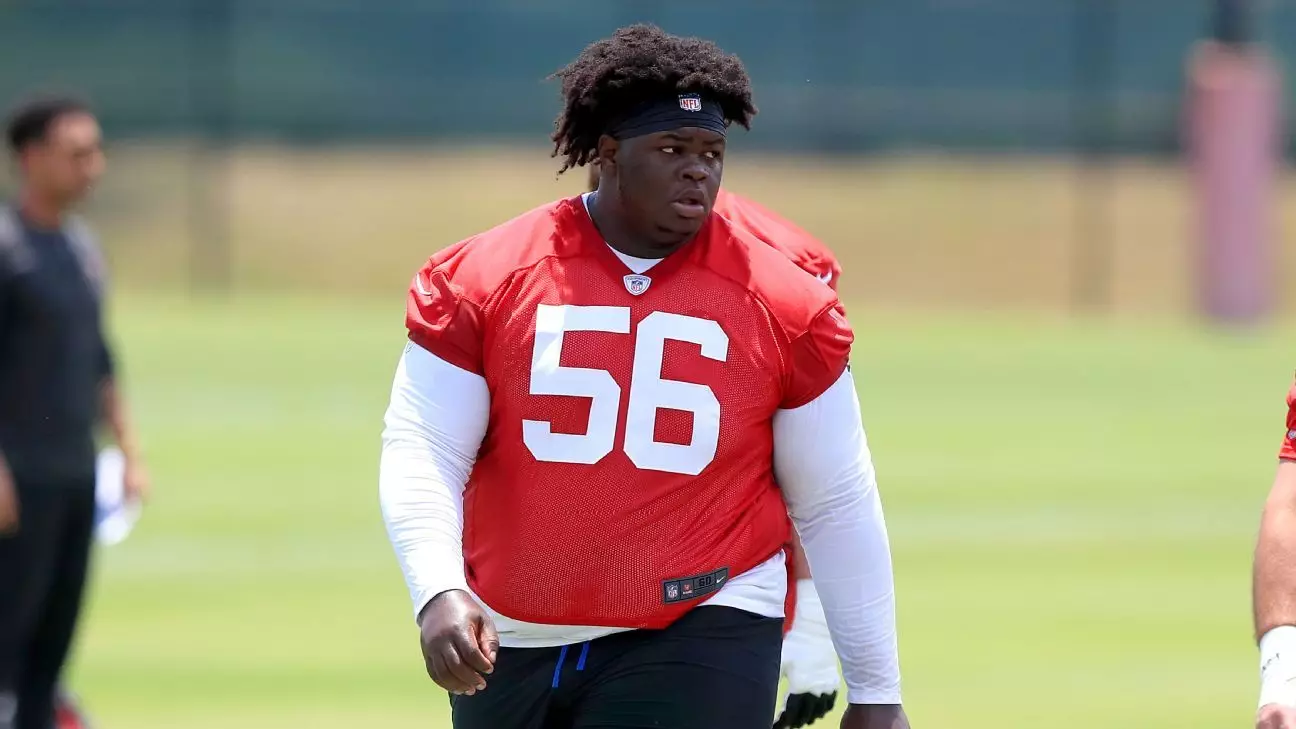Desmond Watson’s journey from the quiet avenues of Plant City, Florida, to the spotlight of the NFL is a testament to personal determination and societal curiosity. Standing at a towering 6-foot-6 and weighing in at 449 pounds, Watson isn’t just rewriting the record books; he is embodying a story that shines a light on preconceived notions about body types in sports. As the newly crowned heaviest player in NFL history, he might have become the face of a unique narrative, but he is determined not to let that overshadow his aspirations as a formidable football player.
Watson’s early life played a crucial role in shaping his character. Growing up in a small Florida town, he was used to being surrounded by love and camaraderie. Seeing himself as both a dreamer and an achiever, it’s only fitting that a pivotal moment in his nascent football career came when he played his last college game at the Buccaneers’ very own Raymond James Stadium. Ironically, a boyhood dream of being right next to his idol, Pro Bowl defensive tackle Vita Vea, is now a reality for him. “It is a dream come true. I feel like you can’t do anything but smile,” Watson expressed, encapsulating the joy of his reality.
Cultural Curiosity and Acceptance
Watson’s size is undoubtedly a focal point both within the locker room and among the fans, drawing a mix of admiration and intrigue. He recognizes this uniqueness not merely as a personal distinction but also as an opportunity to connect with others. The curious gaze of society towards someone of his size reflects a broader conversation about body image, acceptance, and what it means to excel in a professional sport traditionally defined by athletic standards. “I’ve felt the love,” he shared, emphasizing the support he’s received from fans who seem enchanted by his larger-than-life presence.
However, this attention also raises questions about the longevity and viability of his playing career. The fact that Watson is the heaviest player in the league means that perceptions about him are often wired directly to his weight rather than his skills on the field. Bucs defensive line coach Charlie Strong supports Watson’s skills, citing that his size “is mostly unheard of” and hints at the potential he exhibits. Despite the potential risks that come with being heavier in a high-intensity sport like football, shared stories about players like the legendary “Refrigerator” Perry remind us that dominance on the field does not hinge solely on weight.
A Strategic Approach to Development
Coaching staff and management are evidently aware that the road ahead requires a strategic, thoughtful approach. Coach Todd Bowles has emphasized the necessity of fine-tuning Watson’s endurance to ensure he can expand his role beyond just a handful of plays. Watson previously participated in a rotation during his time at the University of Florida, racking up valuable experience but also indicating that there’s more work to be done. “It’s just a matter of getting him to the point where he can play more than two or three plays [per drive],” Bowles stated.
The statistics unveil a somewhat subdued performance during Watson’s college career; however, they also hint at untapped benefits waiting to be discovered. With a run-stop win rate of just above four percent, expectations may need to be recalibrated rather than dismissed. The Buccaneers are clearly implementing a wholesome framework, focusing on habit-building and self-discipline to unlock Watson’s higher potential.
Such holistic development initiatives are reflective of a growing trend in sports that emphasizes athletes’ wellbeing over just their physical stats. The emphasis on nutrition and fitness programs, supervised by experts, indicates that Watson’s team understands the importance of managing his weight responsibly while honing his skills as a player. He himself recognizes the need for continual evaluation of his physical condition to determine where he can best contribute.
A Bond Built on Trust and Accountability
Watson’s relationship with Coach Strong plays a pivotal role in fostering an environment of accountability and growth. Their mutual respect and understanding indicate that success does not come merely from physical attributes but rather the work ethic and commitment to improvement. “He works, and he don’t mind working,” Coach Strong noted, reinforcing that for Watson, discipline can become a cornerstone of his evolving journey in the NFL.
Moreover, Watson’s family support system, particularly from his mother, offers an invaluable safety net in navigating the challenges of professional sports. Her presence signifies the need for strong pillars of encouragement and tough love—a lesson that extends beyond football into life itself. Amid the demands of the NFL, such familial bonds are essential for mental balance, resilience, and a reminder of the core values instilled in him since childhood.
Desmond Watson’s path is emblematic of overcoming stereotypes associated with size in sports, shifting the focus from how much he weighs to how effectively he can adapt and thrive within the framework of the Buccaneers. His determination to define his narrative as a player rather than just a record-holder illustrates the essence of personal triumph and growth.


Leave a Reply